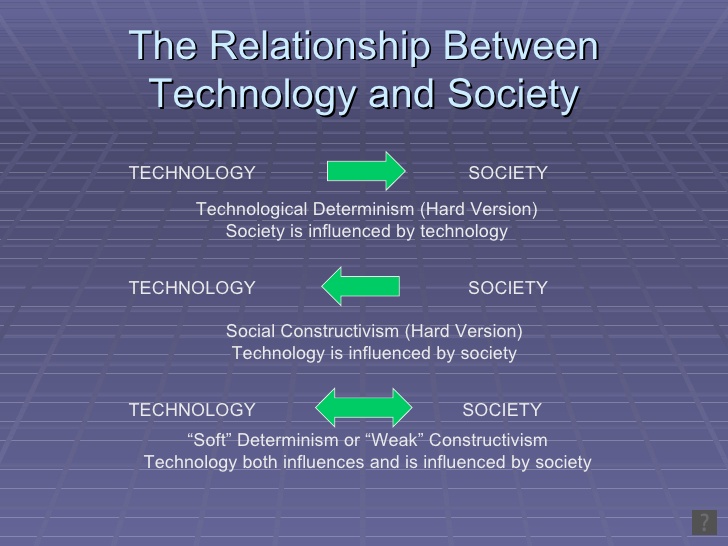In the realm of philosophy and sociology, the discourse surrounding technological and cultural determinism offers a tantalizing exploration of the forces that shape human society. While both perspectives analyze how influence manifests within a civilization, they converge at their definitions but diverge significantly in their implications and applications. This disquisition endeavors to delineate these distinctions in a cogent manner, all while pondering: what if our cultural values were to override our technological advancements?
Technological determinism posits that technology is the primary driver of sociocultural change. This theory asserts that the tools and systems we develop extend beyond mere utility; they shape societal structures, cultural practices, and even individual behavior. One could argue that we have witnessed technology’s formidable grip in recent decades, as innovations like the internet and artificial intelligence redefine education, communication, and work. Enthusiasts of this paradigm often decry the notion of human agency, attributing transformative events to the inevitable march of technology. An archetypal illustration of this can be found in the ongoing debates about climate change. The emergence of fossil fuel technologies propelled industrialization, irrevocably altering environments and lifestyles, often to disastrous consequences.
Conversely, cultural determinism asserts that cultural factors primarily govern human behavior and societal structures. This perspective emphasizes values, beliefs, and norms as the keystones of societal evolution. Instead of viewing technology as the catalyst, cultural determinists might argue that it is the prevailing cultural milieu that dictates the adoption and adaptation of technological innovations. For example, consider the varying acceptance of renewable energy technologies across different cultures. In some societies, environmentalism is deeply ingrained within their moral fabric, motivating proactive measures to invest in sustainable technologies. Herein lies the pivotal idea: culture shapes the lens through which technology is perceived, received, and utilized.
While both frameworks offer valuable insights, their approaches raise questions about agency, responsibility, and the future trajectory of human advancement. Technological determinism can lead to a fatalistic view where society appears powerless in the face of technological imperatives, whereas cultural determinism empowers societies to consciously shape their destinies. Understanding this dichotomy compels us to explore what influences our current technological trajectory and what role our cultural values play in this process.
One must consider the implications of these ideologies on policy-making, particularly in the fight against climate change. For instance, if one adopts a technological determinist view, then solutions like carbon capture and geoengineering could be seen as the linchpins for resolving environmental crises. This could lead to a reliance on untested technologies as more holistic sociopolitical measures are shelved. In stark contrast, a cultural determinist approach would critique such technologies and focus on fostering ecological literacy and sustainable living practices within communities. It would advocate for societal metamorphosis grounded in cultural transformation rather than technological dependency.
This dichotomy raises a provocative challenge: does our embrace of technology inadvertently weaken our cultural values? Are we surrendering our decision-making power to the technological juggernauts? The confluence of social media platforms, for instance, reveals this tension compellingly. On one hand, technology fosters connectivity and democratizes information access; yet, it concurrently exacerbates societal divisions and misinformation. Thus, one must ponder, are we prisoners of our screens, or do we still wield the hammer to mold our reality?
As societies continue to evolve, the interplay between these two forms of determinism remains paramount. Scholars argue that instead of categorizing the relationship solely as a dichotomy, it might be more accurate to view it as a symbiosis. Technology does not develop within a vacuum; it is birthed, nurtured, and ultimately shaped by cultural contexts. In this light, the very act of creating technology is a cultural endeavor. The ways societies innovate, embrace, or resist technologies reflect deeply embedded cultural ethos. It becomes imperative, therefore, to foster a culture of inquiry and critical engagement with technology, ensuring it serves humanity rather than enslaves it.
Moreover, in the age of climate urgency, the juxtaposition of technological and cultural determinism becomes increasingly salient. Should groundbreaking technologies like solar panels and electric vehicles become ubiquitous without a concomitant cultural shift toward sustainability? Here the adage “culture eats strategy for breakfast” rings true. For impactful environmental initiatives to succeed, both technological innovation and cultural adaptation must align harmoniously.
In conclusion, the distinctions between technological and cultural determinism are not merely academic—they resonate profoundly in our everyday lives. By critically examining the interplay between these two forces, we can better comprehend the forces shaping our world and make informed choices about the future. While technology is undoubtedly a formidable force in contemporary society, one must not underestimate the power of culture to critique, adapt, and ultimately steer that technology towards a more sustainable and equitable future. Indeed, the quest for harmony between innovation and cultural ethos remains a challenge worthy of consideration. As we engage in this discourse, each individual must grapple with their role in this narrative of change. What kind of legacy do we wish to carve out for the generations to come?
